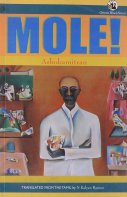Unstuck Time and Ender @ BYOB Party in December 2016 (Part 5)
There was a dash of sci-fi at the BYOB Party this time.
 Adi read the famous satirical novel Slaughterhouse 5 by Kurt Vonnegut. The protagonist Billy Pilgrim is the ultimate time traveler. Vonnegut himself was part of the military at Dresden during WWII and the book focuses on the fire bombing there, only to have the protagonist abducted by aliens. The prisoner of war enters another dimension where ‘all moments, past, present and future, always have existed, always will exist.’ Time is unstuck and the narrative is fluid moving through different moments in time in no particular order. In the world Pilgrim inhabits free will is a myth. The idea of the fourth dimension is a well spring for fiction, philosophy, sci-fi and mathematics. It’s the blind spot that can’t be seen and so from a void comes interpretation.
Adi read the famous satirical novel Slaughterhouse 5 by Kurt Vonnegut. The protagonist Billy Pilgrim is the ultimate time traveler. Vonnegut himself was part of the military at Dresden during WWII and the book focuses on the fire bombing there, only to have the protagonist abducted by aliens. The prisoner of war enters another dimension where ‘all moments, past, present and future, always have existed, always will exist.’ Time is unstuck and the narrative is fluid moving through different moments in time in no particular order. In the world Pilgrim inhabits free will is a myth. The idea of the fourth dimension is a well spring for fiction, philosophy, sci-fi and mathematics. It’s the blind spot that can’t be seen and so from a void comes interpretation.
The idea of aliens led to a discussion on the Sapir Whorf Hypothesis (The hypothesis states that the way people think is strongly affected by their native languages. It is a controversial theory championed by linguist Edward Sapir and his student Benjamin Whorf), the movie Arrival, the reasons behind the ancient Aboriginal individual’s innate sense of direction, Richard Feynman’s experiments, an app for the hearing impaired and language as a means to lie and obfuscate.
Speaking of dimensions, Akshay spoke about a book available online, one called Flatland by Edwin A. Abott. Check out the movie trailer here.
 Dinesh got a sci-fi book by Orson Scott Card called Speaker for the Dead. This is the sequel to the famed Ender’s Game, a book that attained cult status in the US (take the song: Ender will save us all) and was even studied to understand classic military strategy. In the second installment, a second alien race has been discovered and only Ender remains to confront the truth. This book is the winner of the 1986 Nebula Award for Best Novel and won the 1987 Hugo Award for Best Novel. But it hasn’t been all rosy for Orson Scott Card. Read more about the controversy he has been mired in here.
Dinesh got a sci-fi book by Orson Scott Card called Speaker for the Dead. This is the sequel to the famed Ender’s Game, a book that attained cult status in the US (take the song: Ender will save us all) and was even studied to understand classic military strategy. In the second installment, a second alien race has been discovered and only Ender remains to confront the truth. This book is the winner of the 1986 Nebula Award for Best Novel and won the 1987 Hugo Award for Best Novel. But it hasn’t been all rosy for Orson Scott Card. Read more about the controversy he has been mired in here.
More books in Part 6.

 Akshay has been attempting to read a book called
Akshay has been attempting to read a book called 
 It was Sumit’s first time to any book-related group and he made his entry with a non-fiction New York bestseller called
It was Sumit’s first time to any book-related group and he made his entry with a non-fiction New York bestseller called  Apurba is a fan of historical fiction too and spoke about her favorite books including Gone with the Wind and the Ibis trilogy by Amitav Ghosh. She was reluctant to start
Apurba is a fan of historical fiction too and spoke about her favorite books including Gone with the Wind and the Ibis trilogy by Amitav Ghosh. She was reluctant to start 
 This time he talked about
This time he talked about 




 Nidhi spoke about
Nidhi spoke about 
 Aadit, a youngster, talked about the book Captain Underpants by Dav Pilkey. Aahan, a ten year old, spoke affectionately about his favorite illustrator, Quentin Blake. The book he mentioned was
Aadit, a youngster, talked about the book Captain Underpants by Dav Pilkey. Aahan, a ten year old, spoke affectionately about his favorite illustrator, Quentin Blake. The book he mentioned was  Jaya spoke about John Keay’s
Jaya spoke about John Keay’s  The book she discussed was
The book she discussed was  Another novel by Ashokamitran that Anu mentioned was
Another novel by Ashokamitran that Anu mentioned was